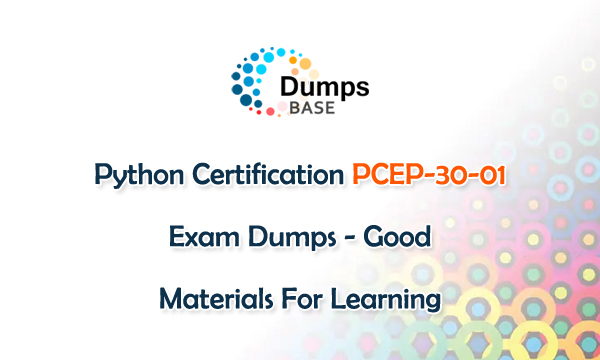Python Certification PCEP-30-01 Exam Dumps - Good Materials For Learning
The important thing to pass the Certified Entry-Level Python Programmer (PCEP) exam is learning and making preparations. To help you study the PCEP-30-01 Certified Entry-Level Python Programmer (PCEP) exam well, we have the latest Python certification PCEP-30-01 exam dumps online. The newest PCEP-30-01 dumps contain 124 practice exam questions and answers, candidates who decided to use DumpsBase PCEP-30-01 exam dumps can read all these questions and answers in pdf and testing engine. After the order is placed successfully, you can download the pdf in the member center without delay. The software will be shared via mail. The Python Institute PCEP-30-01 exam dumps of DumpsBase will help you with creating the PCEP-30-01 Certified Entry-Level Python Programmer exam wherever you want to go.

What is the PCEP Certified Entry-Level Python Programmer certification?
Before downloading the latest Python PCEP-30-01 exam dumps from DumpsBase, we recommend you understand the PCEP Certified Entry-Level Python Programmer certification first. It is a popular certification of Python, which shows that the individual is familiar with universal computer programming concepts like data types, containers, functions, conditions, and loops, as well as Python programming language syntax, semantics, and the runtime environment.
Why do more and more candidates choose to be PCEP certified professionals? The Certified Entry-Level Python Programmer (PCEP) certification will be particularly valuable for:
■ aspiring programmers and learners interested in learning to program for fun and job-related tasks;
■ learners looking to gain fundamental skills and knowledge for an entry-level job role as a software developer, data analyst, or tester;
■ industry professionals wishing to explore technologies that are connected with Python, or that utilize it as a foundation;
■ team leaders, product managers, and project managers who want to understand the terminology and processes in the software development cycle to more effectively manage and communicate with production and development teams.
Earning the PCEP Certified Entry-Level Python Programmer certification is important to IT candidates, they can prove that they have the ability to accomplish coding tasks related to the essentials of programming in the Python language. A test candidate should demonstrate sufficient knowledge of the universal concepts of computer programming, the syntax, and semantics of the Python language, as well as the skills in resolving typical implementation challenges with the help of the Python Standard Library. Candidates who decide to complete the PCEP certification need to pass one of the following exams:
● PCEP-30-02 (Status: Active)
● PCEP-30-01 (Status: Retiring – December 31, 2022)
Currently, we DumpsBase have completed the latest Python PCEP-30-01 exam dumps as good materials for learning. Being provided with the Certified Entry-Level Python Programmer PCEP-30-01 exam dumps questions with all-day customer care business guarantees that you'll receive the best help to answer your Python PCEP-30-01 exam. Secure the PCEP assertion test with the assistance of your Python Institute PCEP-30-01 exam preparation.
Check Free Python PCEP-30-01 Exam Demo Questions
For sure we offer the most effective Python Institute PCEP-30-01 exam dumps questions however, many people get confused in making a choice. The PCEP-30-01 exam dumps of DumpsBase provide you with a substantial chance to try a free PCEP-30-01 exam dumps demo prior to buying. This Python Institute PCEP-30-01 free dumps demo will help you in obtaining each dump for free from any confusion connected to exam Python Institute PCEP-30-01 dumps.
What are the four fundamental elements that make a language?
A. An alphabet, phonetics, phonology, and semantics
B. An alphabet, a lexis, phonetics, and semantics
C. An alphabet, morphology, phonetics, and semantics
D. An alphabet, a lexis, a syntax, and semantics
Answer: D
What will be the output of the following code snippet?
x = 1
y = 2
z = x
x = y
y = z
print (x, y)
A. 1 2
B. 2 1
C. 1 1
D. 2 2
Answer: B
Python is an example of:
A. a machine language
B. a high-level programming language
C. a natural language
Answer: B
What will be the output of the following code snippet?
print(3 / 5)
A. 6/10
B. 0.6
C. 0
D. None of the above.
Answer: B
Strings in Python are delimited with:
A. backslashes (i.e., \)
B. double quotes (i.e., ") or single quotes (i.e., ')
C. asterisks (i.e., *)
D. dollar symbol (i.e., $)
Answer: B
What will happen when you attempt to run the following code?
print(Hello, World!)
A. The code will raise the SyntaxError exception.
B. The code will raise the TypeError exception.
C. The code will raise the ValueError exception.
D. The code will print Hello, World! to the console.
E. The code will raise the AttributeError exception.
Answer: A
A function definition starts with the keyword:
A. def
B. function
C. fun
Answer: A
Assuming that the tuple is a correctly created tuple, the fact that tuples are immutable means that the following instruction:
my_tuple[1] = my_tuple[1] + my_tuple[0]
A. can be executed if and only if the tuple contains at least two elements
B. is illegal
C. may be illegal if the tuple contains strings
D. is fully correct
Answer: B
What is the expected output of the following code?
def func(x):
return 1 if x % 2 != 0 else 2
print(func(func(1)))
A. The code is erroneous.
B. None
C. 2
D. 1
Answer: D
Take a look at the snippet, and choose the true statements: (Select two answers)
nums = [1, 2, 3]
vals = nums
del vals[1:2]
A. nums is longer than vals
B. nums and vals refer to the same list
C. vals is longer than nums
D. nums and vals are of the same length
Answer: B,D
